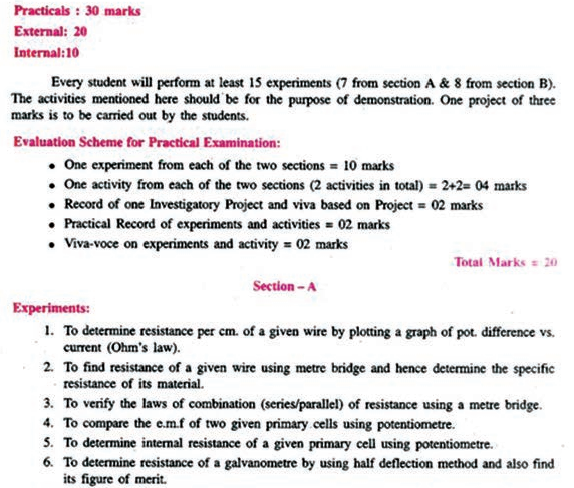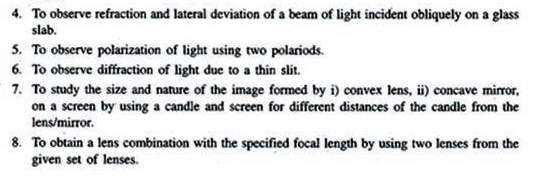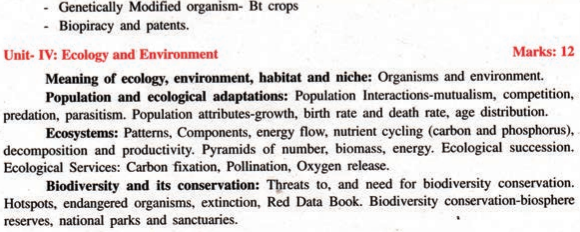JKBOSE 12th Syllabus mentions the chapters and topics to be covered while preparing for 12th board exams. Read below to know the complete syllabus of JKBOSE 12th Class of Science stream.
The Jammu and Kashmir State Board of Secondary Education (JKBOSE) is responsible for conducting Class 10 and 12 board examinations in the state of Jammu and Kashmir. The three main streams offered by the JKBOSE are Science, Commerce, and Arts.
Science is widely considered as the most difficult stream with an extensive syllabus. The syllabus of JKBOSE Class 12 Science stream is divided into compulsory and optional subjects. The compulsory subjects of JKBOSE Class 12 Science stream are Physics, General English, and Chemistry. The subject list of JKBOSE Class 12 Science stream is given below:
JKBOSE 12th aspirants in All India like these B.Tech colleges
Students like you from All India who showed interest in JKBOSE 12th also showed interest in these B.Tech colleges
- JKBOSE 12th Science Stream Subject List
- JKBOSE 12th Exam Pattern and Marking Scheme
- JKBOSE12th Syllabus for Science Stream
JKBOSE 12th Science Stream Subject List
The students of JKBOSE 12th Class Science stream shall have to opt for any two subjects from Group IV to VII and not more than one from each group (for non-vocational students only). Also, the students who intend to opt for a vocational subject at Higher Secondary Part-II (Level-Four) (after passing vocational subject/s at Level Three in Class 11) will have to opt for the fifth subject from Group VIII.
| Group |
Subject Name |
|---|---|
| Group I |
General English (Compulsory) |
| ` |
Physics (Compulsory) |
| Group III |
Chemistry (Compulsory) |
| Group IV |
Mathematics, Applied Mathematics |
| Group V |
Biology, Statistics, Geography |
| Group VI |
Geography, Biotechnology, Microbiology, Biochemistry |
| Group VII |
Computer Science, Information Practices, Environmental Science, Functional English, Physical Education, Islamic Studies, Vedic Studies, Buddhist Studies, Electronics |
| Group VIII (Vocational Courses) |
IT and ITes, Retail, Healthcare, Tourism, Security, Agriculture, Telecommunication, Media and Entertainment, Beauty and Wellness, Physical Education and Sports |
Every student preparing for board examinations should know the syllabus and focus on completing the same on time. A proper study schedule is important for the students to cover and revise all the topics. Therefore, understanding the JKBOSE 12th Class syllabus is essential for each student. This article discusses the JKBOSE Class 12 Science syllabus in detail.
Read more: Electrostatic Potential and Capacitance NCERT Solutions
JKBOSE 12th Exam Pattern and Marking Scheme
(I) According to JKBOSE 12th exam pattern, the performance in each subject shall be assessed through a single paper of 70 marks for Science subjects and 100 marks for Mathematics of 3 hours duration.
- a) For the subjects involving practical assessment, there shall be an external practical examination of 20 marks of three hours duration.
- b) The marks reserved for internal assessment (which is 10 in case of each subject) shall be awarded by the schools themselves, as part of internal assessment, on the basis of performance of students in two tests (each test of 04 marks) and quality of reportage, i.e. practical notebook (carrying 02 marks) maintained by the student.
(II) In the case of Biology, 10 marks are reserved for the internal assessment — five marks for Botany and five for Zoology. The external practical examinations of Botany and Zoology shall be of 10 marks and two hours duration, respectively.
| Subject |
Theory |
Internal Assessment |
External Examination |
Total |
|---|---|---|---|---|
| Physics |
70 |
10 |
20 |
100 |
| Chemistry |
70 |
10 |
20 |
100 |
| Biology |
70 |
10 |
20 |
100 |
| Biotechnology |
70 |
10 |
20 |
100 |
| Microbiology |
70 |
10 |
20 |
100 |
| Biochemistry |
70 |
10 |
20 |
100 |
| Geography |
70 |
10 |
20 |
100 |
| Geology |
70 |
10 |
20 |
100 |
| Mathematics |
100 |
x |
x |
100 |
| Statistics |
70 |
10 |
20 |
100 |
| Environmental Science |
70 |
10 |
20 (Ext./ P.W.) |
100 |
| Informatics Practices |
70 |
10 |
20 |
100 |
| Computer Science |
70 |
10 |
20 |
100 |
| Food Technology |
70 |
10 |
20 |
100 |
JKBOSE12th Syllabus for Science Stream
Physics
The syllabus of JKBOSE Class 12 Physics is divided into two parts, Part-A and Part-B. The total marks allocated for Physics examination are 100 — 70 marks for the theory exam and 30 marks for the practical assessment (10 marks for internal and 20 marks for external). The syllabus of JKBOSE Class 12 Physics is given below:
| Units |
Topics |
Marks |
|---|---|---|
| Unit 1 – Electrostatics |
Electric charges, electric field, electric flux, electric potential conductor and insulators |
08 |
| Unit 2 - Current Electricity |
Electric current, Ohm's law, internal resistance, and all relevant concepts |
07 |
| Unit 3- Magnetic Effects of Current and Magnetism |
Magnetic field, force, torque, and all related concepts, current loop |
08 |
| Unit 4- Electromagnetic Induction and Alternating Currents |
Electromagnetic induction, Faraday's laws, e.m.f and current, inductance, alternating currents, lCR circuits, AC generator, and transformer |
08 |
| Unit 5- Electromagnetic Waves |
Need for displacement, current, electromagnetic waves, transverse nature of electromagnetic waves, electromagnetic spectrum |
03 |
| Unit 6- Optics |
Ray optics, scattering of the light blue colour of the sky, optical instruments, wave optics, diffraction, radiation |
14 |
| Unit 7 - Dual Nature of Matter and Radiation |
Dual nature of radiation, Photoelectric effect, Hertz and Lenard's observation, Matter waves |
04 |
| Unit 8 - Atoms and Nuclei |
Alpha particle scattering experiment, hydrogen spectrum, Rutherford Model of the atom, x-rays characteristics, atomic masses, radioactive decay |
06 |
| Unit 9 - Electronic Devices
|
Energy bands in solids, conductors, insulators and semiconductors |
07 |
| Unit 10-Communication System
|
Elements of communication system, the bandwidth of transmission mediums, need for modulation |
05 |
Also read:
Electrostatic Potential and Capacitance NCERT Solutions
Practical Assessment
The total marks allotted for JKBOSE Class 12 Physics practical assessment is 30. The complete break-up for the practical assessment is tabulated below:
The time duration for the JKBOSE Chemistry practical assessment is three hours. The total marks allocated for Chemistry practical assessment is 30 marks — 20 marks for external evaluation and 10 marks for internal evaluation.
Biology
The syllabus of JKBOSE Class 12 Biology is divided into two parts – Botany and Zoology. The total marks allocated for Biology examination is 100 — 70 marks for the theory exam and 30 marks for the practical assessment. The detailed syllabus for JKBOSE Class 12 Biology is given below:
Practical Assessment
The time duration for the JKBOSE Class 12 Biology practical assessment is three hours. The total marks for the practical assessment is 30, including external and internal evaluation.
Biotechnology
The total marks allocated for Biotechnology examination is 100 — 70 marks for the theory exam and 30 marks for the practical assessment. The detailed syllabus for JKBOSE Class 12 Biotechnology is given below:
| Units |
Topics |
Marks |
|---|---|---|
| UNIT I: Recombinant DNA Technology |
Introduction, • Tools of DNA Technology, • Vectors-plasmid, cosmid, phage, BAC and YAC, animal and plant viral vectors, • Enzymes used in cloning-Restriction enzymes, DNA ligase and Alkaline phosphatase, • Host cells, Marking recombinant DNA, Introduction of recombinant DNA into host cells, • Identification of recombinants, DNA library (Elementary Idea) • DNA isolation from bacteria, Plants and blood, Plasmid DNA isolation, Polymerase chain reaction, • DNA probes DNA hybridization techniques-Southern and Northern blotting, DNA sequencing-chain termination method, Site-directed mutagenesis. (Brief Idea) |
15 |
| UNIT II Protein Structure and Engineering |
• Introduction to the world of protein, • 3-D shape of proteins, • Structure-function relationship in proteins-Chymotrypsin and Haemoglobin, • Purification of proteins- salting out, chromatography, Dialysis, SDS-PAGE, Western blotting, • Characterization of proteins- Two-dimensional gel electrophoresis, Peptide mapping, Protein sequencing, Mass spectrometry, • Protein based products- blood products and vaccines, enzymes, antibodies, hormones and growth factors, industrial enzymes, non-catalytic proteins, nutraceutical proteins, • Designing proteins- Improving laundry detergent Subtilisin, Creation of novel proteins, Improving the nutritional value of cereals and legumes, Proteomics- basic idea |
15 |
| UNIT III Genomics and Bioinformatics |
· Introduction, Genomics, Structural genomics and Functional genomics, Genome sequencing projects- Directed sequencing of Bacterial Artificial Chromosome (BAC) contigs, Random shotgun sequencing, Genome Similarity, SNPs and Comparative Genomics. · Introduction to Bioinformatics, Information sources- Major databases (NCBI, Entrez and EMBL), BLAST family of search tools, Analysis using Bioinformatics tools |
10 |
|
|
Cell Culture Technology |
|
| UNIT IV Microbial Cell Culture and Applications |
· Introduction, Microbial culture techniques- Nutrient for microbial culture, Culture Procedures, Equipment for microbial culture, Types of microbial culture- Batch culture, Fed-batch culture and Continuous culture, Measurement and kinetics of microbial growth, Microbial growth measurement: quantifying cell concentration. · Scale-up of microbial processes, Isolation of microbial products, Strain isolation, improvement, metagenomics and preservation, Culture Collections Centers, Applications of microbial culture technology, Biosafety issues in Microbial Technology |
10 |
| UNIT V Plant Cell Culture and Applications |
Introduction, Cell and Tissue Culture Techniques- Nutritional media, Types of cultures, Plant regeneration pathways, Applications of Cell and Tissue culture- Micropropagation, Virus-free plants, Artificial seeds, Embryo rescue, Haploids and Triploids, Somatic hybrids and cybrids, Production of Secondary metabolites, Somaclonal variation, In vitro plant germplasm conservation, Gene transfer methods in plants- vector and non-vector mediated, Transgene analysis brief idea), Transgenic plants with beneficial traits- Stress tolerance (biotic and abiotic), Delayed fruit ripening, Male sterility, Transgenic plants as bioreactors (Molecular farming), Metabolic engineering and secondary products, Biosafety issues in Plant Genetic Engineering. |
10 |
| UNIT VI Animal Cell Culture and Applications |
Introduction, Animal Cell Culture Techniques- Features of animal cell growth in culture, Primary Cell Cultures, Secondary Cell Cultures and cell lines, Types of cell lines, Finite Cell Lines, Continuous Cell Lines, Physical environment for culturing Animal Cells- Temperature, pH, Osmolality, Medium, Serum and Antibiotics, Vessels and Equipments, Characterization of Cell Lines, Storage and Revival of cells. Methods of Gene Delivery into cells, Scale-up of Animal Culture Process, Applications of Animal Cell culture, Hybridoma Technology, Stem Cell Technology, Tissue engineering a brief idea. |
10 |
Practical Assessment
The time duration for the JKBOSE Class 12 Biotechnology practical assessment is three hours. The total marks for the practical assessment are 30 including external and internal evaluation.
| Assessment |
Marks |
|---|---|
| Internal Assessment |
10 |
| Project work |
06 |
| Viva |
04 |
| External Assessment |
20 |
| One Experiment |
12 |
| Practical Record |
04 |
| Viva |
02 |
| Attendance |
02 |
List:
- Precipitation of serum albumins and globulins by ammonium sulphate
- Separation of plant pigments/amino acids by paper chromatography
- Isolation of genomic DNA from bacteria/plant/blood.
- Analysis of genomic or plasmid DNA using Agarose Gel Electrophoresis
- Download a DNA, mRNA and a Protein sequence from NCBI, analyse and comment on it
- Culture bacteria by Streak Culture Technique
- Production and estimation of ethanol from microbial culture
- Preparation of explants for plant tissue culture
- Preparation of Murashige Skoog medium
- Synthesis of artificial seed
- Blood group typing
- Cell viability test by dye exclusion method
Project Work
- Lab visits, sum up the list of equipments, facilities and conditions and their utilities.
- Interaction with a faculty/ PhD scholar during the visit and submit a report on the work that is being carried out by the duo.
- Access the internet at www. ncbi.nlm.nih.gov or www.googlescholar.com and download the articles form and any of the discipline pertaining to the syllabus and critically comment on the download articles.
- Field visit to plant gene banks of IIIM (Jammu/Srinagar or DRDO (Leh) or and Biotechnology Departments of SKUAST Jammu/Kashmir or Universities of J&K/ Ladakh/Colleges
Mathematics
The total marks allocated for the Mathematics examination is 100. The syllabus for JKBOSE Class 12 Mathematics is given below:
| Units |
Topics |
Marks |
|---|---|---|
| UNIT I Relations and Functions |
1. Relations and Functions: Types of relations: reflexive, symmetric, transitive and equivalence relations. One to one and onto functions, composite functions, inverse of a function. Binary operations. 2. Inverse Trigonometric Functions: Definition, range, domain, principal value branches. Graphs of inverse trigonometric functions. Elementary properties of inverse trigonometric functions. |
10 |
| UNIT II Algebra |
1. Matrices Concept, notation, order, equality, types of matrices, zero matrix, transpose of a matrix, symmetric and skew-symmetric matrices. Addition, multiplication and scalar multiplication of matrices, simple properties of addition, multiplication and scalar multiplication. Non – commutativity of multiplication of matrices and existence of non - zero matrices whose product is the zero matrix (restrict to square matrices of order 2). Concept of elementary row and column operations. Invertible matrices and proof of the uniqueness of inverse, if it exists; (Here all matrices will have real entries) 2. Determinants The determinant of a square matrix (up to 3 x 3 matrices), properties of determinants, minors, cofactors and applications of determinants in finding the area of a triangle, Adjoint and inverse of a square matrix. Consistency, inconsistency and number of solutions of a system of linear equations by examples, solving system of linear equations in two or three variables (having unique solution) using the inverse of a matrix. Cramer’s rule and its applications. |
13 |
| UNIT III Calculus |
1. Continuity and Differentiability. Continuity and differentiability, derivative of composite functions, chain rule, derivatives of inverse trigonometric functions, a derivate of implicit functions. Concept of exponential and logarithmic functions to the base, e. Logarithmic functions as inverse of exponential functions. Derivative of logarithmic and exponential functions. Logarithmic differentiation, derivative of functions expressed in parametric forms. Second-order derivatives. Rolle’s and Lagrange’s Mean Value Theorems (without proof) and their geometric interpretations and simple applications. 2. Applications of Derivatives. Applications of derivatives: rate of change, increasing/decreasing functions, tangents & normals, approximation, maxima and minima (first derivative test motivated geometrically and second derivative test given as a provable tool). Simple problems (that illustrate basic principles and understanding of the subject as well as real-life situations). 3. Integrals. Integration as the inverse process of differentiation. Integration of a variety of functions by substitution, by partial fractions and by parts, only simple integrals of the type to be evaluated. Definite integrals as a limit of a sum, Fundamental Theorem of Calculus (without proof), Basic properties of definite integrals and evaluation of definite integrals. 4. Applications of the Integrals. Applications in finding the area under simple curves, especially lines, area of circles/parabolas/ellipses (in standard form only), area under the curve y = sin x, y = cos x, area between the two above said curves (the region should be identifiable). 5. Differential Equations. Definition, order and degree, general and particular solutions of a differential equation. Formation of differential equation whose general solution is given. Solution of differential equations by the method of separation of variables, homogeneous differential equations of first order and first degree. Solutions of linear differential equation of the type : |
44 |
| UNIT IV Vectors and Three – Dimensional Geometry |
1. Vectors. Vectors and scalars, magnitude and direction of a vector. Direction cosines/ratios of vectors. Types of vectors (equal, unit, zero, parallel and collinear vectors), position vector of a point, negative of a vector, components of a vector, addition of vectors, multiplication of a vector by a scalar, position vector of a point dividing a line segment in a given ratio. Scalar (dot) product of vectors, projection of a vector on a line. Vector (cross) product of vectors. Scalar triple product. 2. Three–dimensional Geometry. Direction cosines/ratios of a line joining two points. Cartesian and vector equation of a line, coplanar and skew lines, shortest distance between two lines. Cartesian and vector equation of a plane. Angle between (i) two lines (ii) two planes (iii) a line and a plane. Distance of a point from a plane. |
17 |
| UNIT V Linear Programming |
1. Linear Programming. Introduction, definition of related terminology such as constraints, objective function, optimization, different types of linear programming (L.P) problems, the mathematical formulation of L.P. problems, graphical method of solution for problems in two variables, feasible and infeasible regions, feasible and infeasible solutions, optimal feasible solutions (up to three non-trivial constraints). |
6 |
| UNIT VI Probability |
1. Probability. Multiplication theorem on probability. Conditional probability, independent events, total probability. Baye’s Theorem, Random variable and its probability distribution, mean and variance of a random variable. Repeated independent (Bernoulli) trials and Binomial distribution. |
10 |
Microbiology
The total marks allocated for Microbiology examination are 100 — 70 marks for the theory exam and 30 marks for the practical assessment. The detailed syllabus for JKBOSE Class 12 Microbiology is given below:
Read More:


















With a degree in MBA from ICFAI University and work experience in all sectors of education, Jasleen wishes to guide students selecting the best academic course, keeping their personalities in mind to build a bright
Read Full Bio